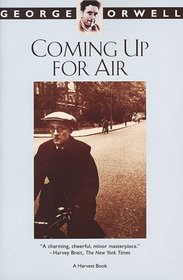Helpful Score: 2
George Bowling, an overweight middle-age insurance salesman with a new set of dentures evaluates his life of quiet desperation in the England between the wars. He sees war with Germany looming on the horizon once more and anticipates a German invasion of Britain. In that stage of mid-life reevaluation that comes to all men he recognizes that happiness and contentment can be found in the simple of things of life - enjoying the countryside, smelling the flowers etc., so he decides to sneak off for a week to his old childhood haunts and fish a cetain pond that he always meant to fish but never got around to.
Well, they say you can never go home again and when he does virtually nothing is as he remembers it.
While this is a light-hearted novel it is written with tremendous insight both into the psyche of his protagonist (George) and the looming war with Germany. Several passages describes his fears of a post war society and those ideas were further fleshed out ten years later (after the war) in Nineteen Eighty-Four.
On a personal level, I could relate to his return visit to his boyhood haunts. When I did the same thing twenty years after emigrating and returned to my old haunts in England, there was a sense of bewilderment. Memory proved to be defective and while the town was still somewhat recognizable, so much had changed too and I realized that I was now a stranger to all that was once so familiar.
Well, they say you can never go home again and when he does virtually nothing is as he remembers it.
While this is a light-hearted novel it is written with tremendous insight both into the psyche of his protagonist (George) and the looming war with Germany. Several passages describes his fears of a post war society and those ideas were further fleshed out ten years later (after the war) in Nineteen Eighty-Four.
On a personal level, I could relate to his return visit to his boyhood haunts. When I did the same thing twenty years after emigrating and returned to my old haunts in England, there was a sense of bewilderment. Memory proved to be defective and while the town was still somewhat recognizable, so much had changed too and I realized that I was now a stranger to all that was once so familiar.
Truthfully I found this one a little dull but for the avid Orwell fan it is worth having and reading.
Great Orwellian satire full of irony. I loved it
Chapter 1 is satirical and witty: just my cup of tea. Its a dig at the 1930s. George, our hero, finds himself the proud possessor of a boon of 17 quid, the result of a wager on a nag that broke the rules and won fairly. But I am disappointed as the next chapter begins the protagonists boring biography followed by two chapters onof all thingsfishing! Oh well, at least it isnt cricket. By Chapter 7 he is reading for WW I and by Chapter 8 is in it. Now for some fun with the wartime bureaucracy! That over, what can George do with his free quid? How about a separate (and secret) vacation back to his roots? Off he goes only to find that you really cant go home again.




